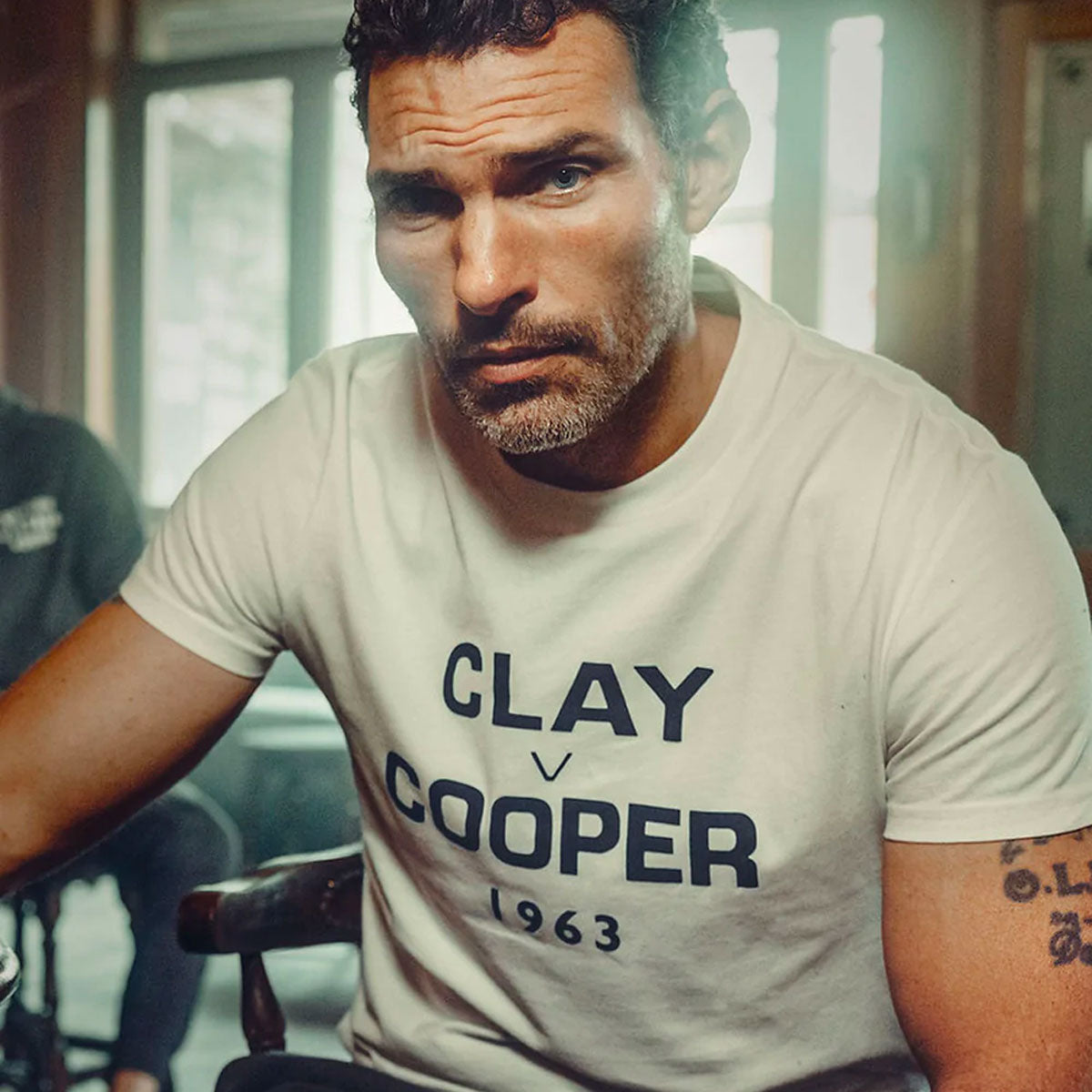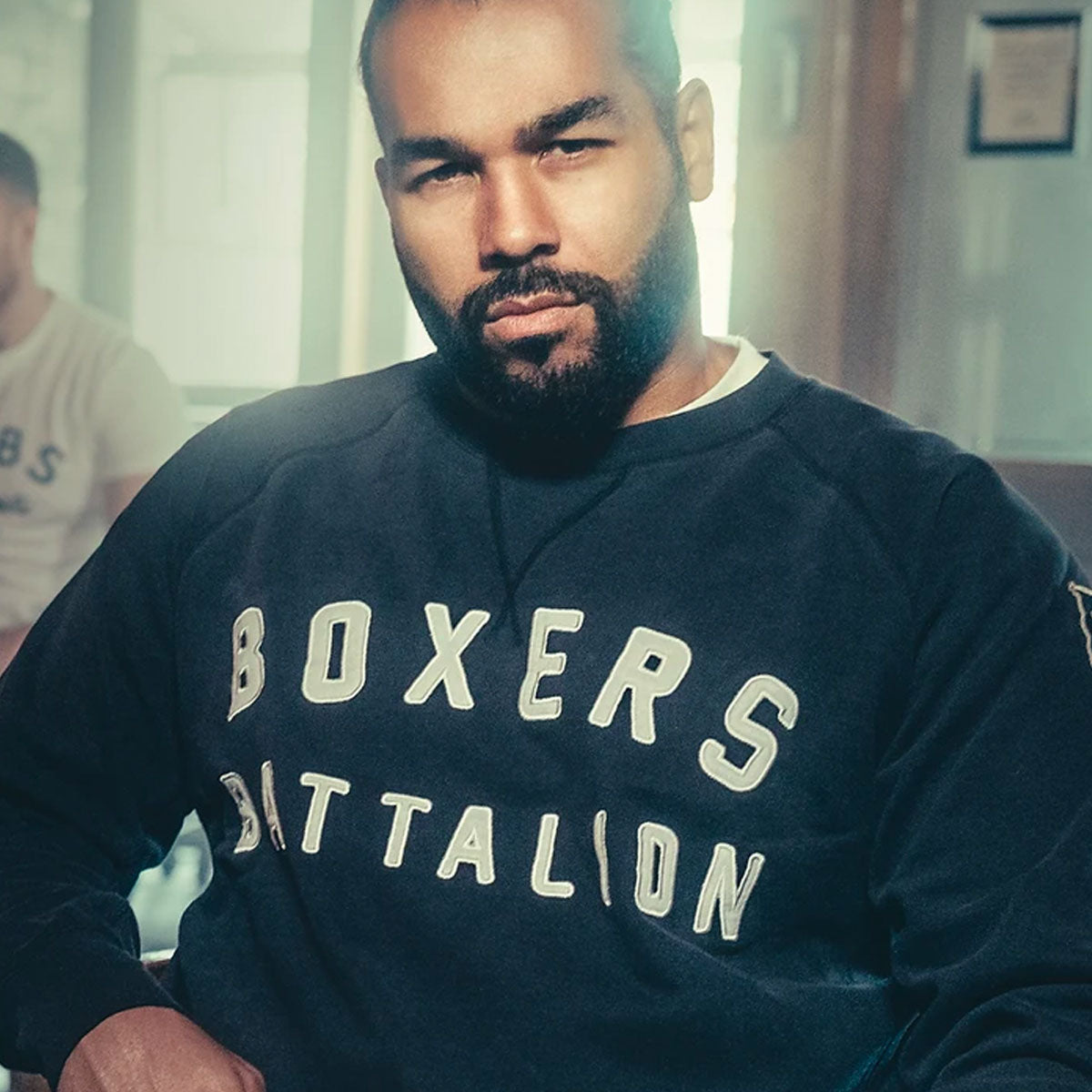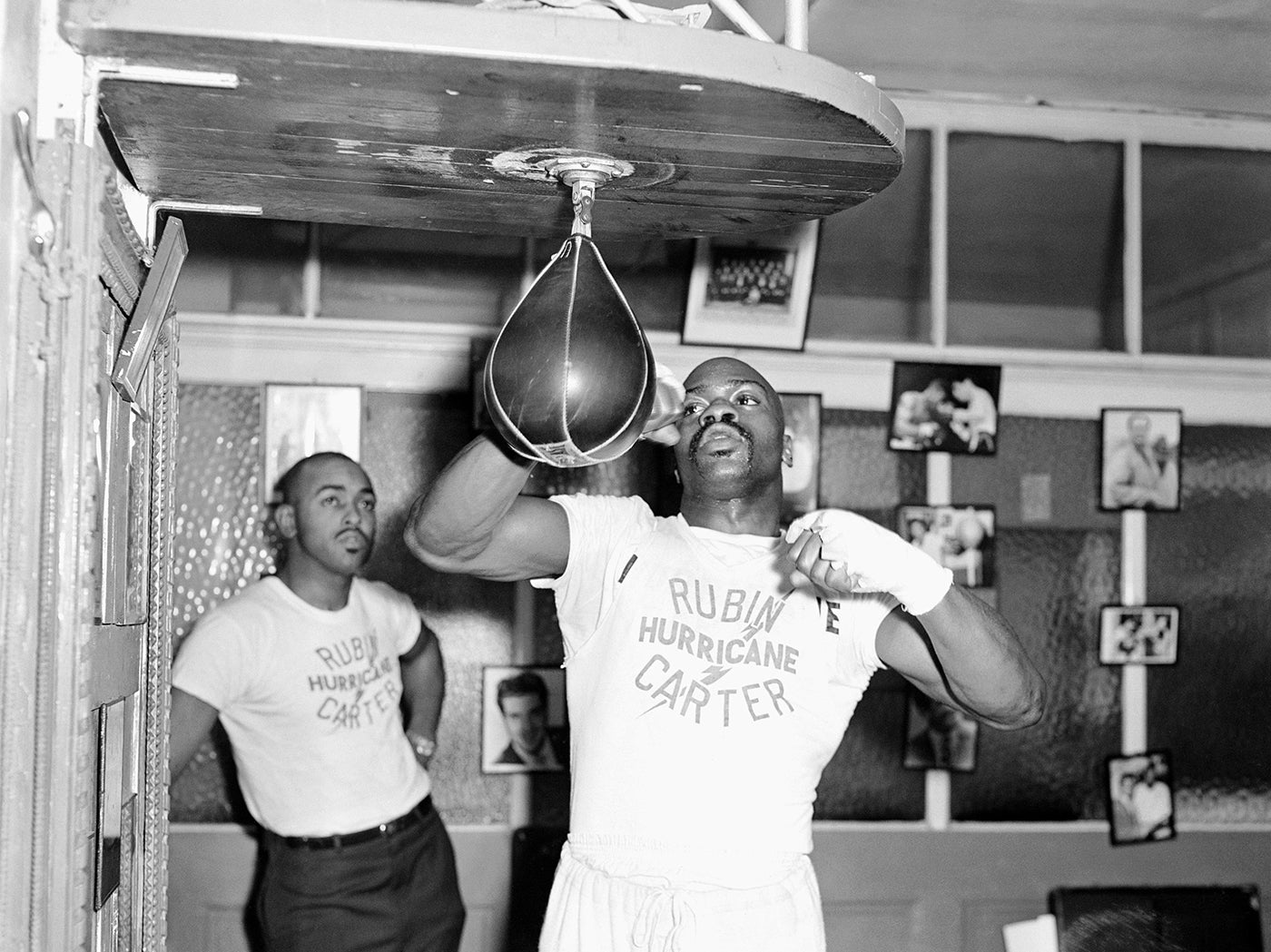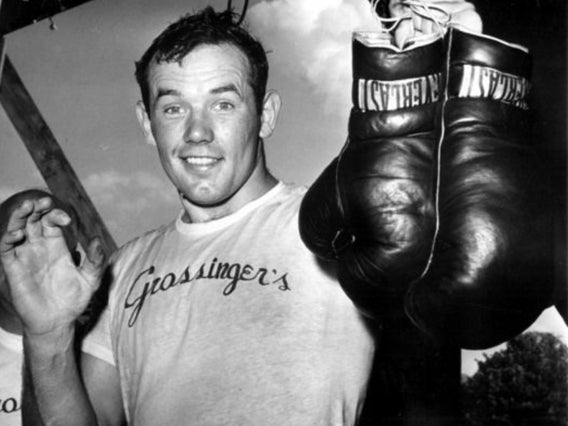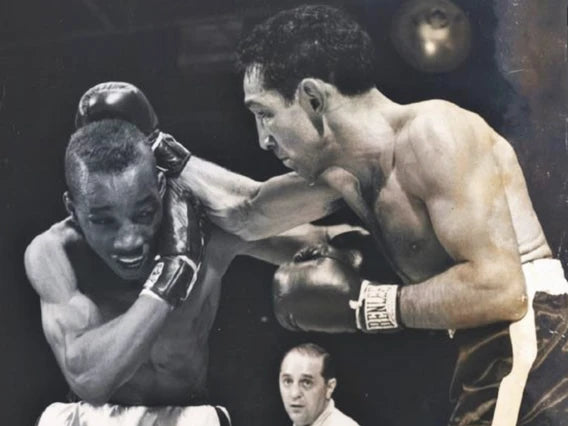
American middleweight boxer, Rubin Carter possessed a fierce left hook that earned him many early-round knockouts and the nickname, ‘Hurricane.’ His life however was just as stormy and violent as his name suggests.
Born in Clifton, New Jersey on 6 May 1937, Carter made his acquaintance with the law at a young age. His father was a church deacon who believed in firm discipline and aged nine turned Carter over to the police after stealing clothes. Two years later he was sent to a juvenile reformatory after stabbing a man he claimed had tried to abuse him.
After spending six years in the reformatory, Carter escaped and joined the army at 17. It was while he was stationed in Germany that he turned his hand to boxing. He was however discharged as unfit for service after only 21 months for a number of disciplinary offences.
Following his discharge, Carter returned to New Jersey and within a few months was sent to prison for a violent mugging. He resumed boxing whilst behind bars and turned professional soon after his release in September 1961, winning his first fight a matter of weeks later. With his aggressive style he quickly became a crowd favourite and by the end of the year was already 4-0, gaining rank and reputation.
Carter vs Emile Griffith 1963
1963 was a good year for Carter. After his marriage to Mae Thelma, he shook the boxing world by stopping former world welterweight champion, Emile Griffith in the opening stanza. It’s worth noting how impressive this victory was. Griffith went on to regain world honours in two weight divisions, making several defences over the next four years. Two months later Carter defeated future world heavyweight champion, Jimmy Ellis over 10 rounds on points, however, it was Carter’s victory over Griffith that turned him from underdog to contender, as he challenged Joey Giardello for his middleweight world title straps on 14 December 1964. Despite landing a number of solid shots, Giardello controlled much of the 15 round championship match and won a unanimous points decision.
In the same way his victory over Griffith propelled him to world level boxing, his loss to Giardello sent him down the slide in terms of his ranking. Carter fought nine times in 1965 winning five and losing four, which included a wide points loss against former and future world middleweight champion, Nigerian born Dick Tiger. Five months after the Carter victory, Tiger defeated Giardello over 15 rounds to regain his titles he had lost to him two years prior.
 Carter vs Dick Tiger 20-05-1965 loses by UD over 10 rounds
Carter vs Dick Tiger 20-05-1965 loses by UD over 10 rounds
Carter’s life would change for all the wrong reasons in 1966 when he and his friend, John Artis were arrested following a fatal shooting at a Patterson bar. At 2.30am on 17 June, two men entered the Lafayette Bar and Grill and shot four people with fatal consequences. Two men were killed at the scene, another died in hospital a month later from injuries sustained and the fourth victim survived, albeit blinded in one eye. The latter two victims both described the attackers as being black. All of the victims were white.
Police stopped a car containing Carter, Artis and a third man by the name of John Royster, who were on their way home from a nearby nightclub after the shooting had happened. After a brief questioning, the trio were left to go home.
Two eyewitnesses, Patricia ‘Patty’ Valentine and Alfred Bello reported seeing two black men escaping the bar in a white car with out of state license plates. This description matched Carter’s white Dodge Polara, which also had out of state number plates. After dropping Royster off, Carter and Artis were stopped again, arrested and interrogated for 17 hours before being released.
A few months after the murders, police discovered Bello had been in the area to act as a lookout while his accomplice Arthur Bradley burgled a nearby building. On seeing the shooters flee the Lafayette Bar and Grill, Bello quickly entered the building and robbed the cash register while dead bodies and injured parties lay on the floor. It is claimed that in exchange for leniency of their own crimes and a tidy offer of $10,500 reward for identifying the murderers leading to successful arrest, Bello changed his story and identified Artis as one of the gunmen. Bradley claimed the other was Carter and the pair were consequently re-arrested and charged with murder while Bello and Bradley walked away far richer than the cash register had provided.
During their trial in 1967, Carter and Artis both testified and denied any involvement in the shooting. Descriptions given by eyewitnesses did not match either man. No forensic evidence linked them to the murderers and they both passed polygraph examinations during questioning, which beggars belief that the trial still held in court. Incredibly, the all-white jury found Carter and Artis guilty of three counts of murder on 26 May 1967 and were consequently sentenced to life sentences.
During his time in prison Carter focused on his appeal, studying law and earning a college degree. Although he is credited with helping to diffuse a prison riot he admits he was far from being a model inmate. Carter was quoted as saying, ‘Because I was innocent, I refused to act like a guilty man. I refused to obey the prison rules.’ (Kenneth Klomsky, ‘Going The Distance,’ August 2003).
Carter spent most of his time writing while serving his life sentences, scribing his autobiography, ‘The Sixteenth Round,’ which was published in 1974. That same year Bello and Bradley withdrew their identifications of Carter and Artis, with three recantations forming the basis of motions for new trials. Unfortunately, these motions were denied.
Support for Carter grew and Bob Dylan released the protest song, ‘The Hurricane’ in 1973, whilst many celebrities organised major fundraising concerts for Carter’s benefit. On 17 March 1976, The New Jersey State Supreme Court reversed the convictions and after Muhammad Ali paid a combined bail of £35,000, both Carter and Artis were freed, pending retrial.
In April 1976, while on bail Carter allegedly beat bail bondswoman Carolyn Kelley over a disputed hotel bill. Carter denied the allegation and despite insufficient evidence for prosecution, support for Carter faded quickly.
A joint retrial began in October 1976 with the defence focusing on evidence supporting the theory that the police had framed Carter and Artis. Despite claims of witnesses being coached and evidence planted, the jury once again convicted both men on three counts of murder on 21 December and their life sentences were re-imposed. Carter’s wife, Mae Thelma divorced him soon after for being unfaithful to her while on bail.
In the early 1980’s a New York born teenager by the name of Lesra Martin came across a copy of Carter’s autobiography in a bookshop. Martin came from a poor and deprived background, was illiterate, but had been fortunate enough to be taken in by a Canadian commune who took him under their wings and helped him with a formal education. On reading The Sixteenth Round, Martin turned to his guardians and said, ‘We have to get him out.’ Teenage Martin, along with a dozen likeminded Canadians turned out to be the pivotal key to Carter’s next stage of his life.
The Hurricane continued to appeal and his case was heard in federal court in 1985. Judge Haddon Lee Sarokin granted a writ of habeas corpus and overturned the 1976 convictions of Carter and Artis on 8 November 1985. Sarokin stated, ‘the convictions were based on an appeal to racism rather than reason, concealment rather than disclosure.’ Artis had been paroled in 1981 and Carter was immediately freed without bail.
Prosecutors decided against a third and final round in court and filed a motion to dismiss the original indictments. Judge Ralph Martin granted the motion on 26 February 1988 and dismissed the charges against both men.
After his release from prison Carter moved to Toronto where he became a Canadian citizen and remarried. In 1993 he became executive director of the Association in Defence of the wrongfully Convicted (AIDWYC) and the same year he also received an honorary world title belt from the WBC, which was the first time that had ever happened. He was also inducted into the New Jersey Boxing Hall of Fame.
Two further books have been written about Carter’s life. ‘Lazarus and the Hurricane,’ by Sam Chaiton and Terry Swinton, and ‘The Hurricane: The Miraculous Journey of Rubin Carter,’ by James Hirsch. The latter was the inspiration for Norman Jewison’s film, ‘The Hurricane,’ for which Hollywood legend Denzel Washington went on to win a Golden Globe for his portrayal of Carter.
In 2004 Carter parted ways with AIDWYC and founded his own group, Innocence International, where he continued to work with great empathy to free the wrongfully imprisoned. Her served as a motivational speaker and in October 2005 received an honorary Doctorate of Law.
While attending the International Justice Conference in Burswood, Western Australia in March 2012, Carter revealed he had terminal prostrate cancer. John Artis relocated and moved in with his old friend and cared for him for his remaining months. Unfortunately, Carter lost his battle with cancer on 20 April 2014 aged 76. Artis was by his side at the time of death. Carter is survived by two children from his marriage to Mae Thelma.
Carter’s legacy continues through Innocence International where those who fight the storm of injustice have a Hurricane in their corner.
‘That’s the story of The Hurricane
But it won’t be over till they clear his name’
Bob Dylan, ‘Hurricane,’ 1975

